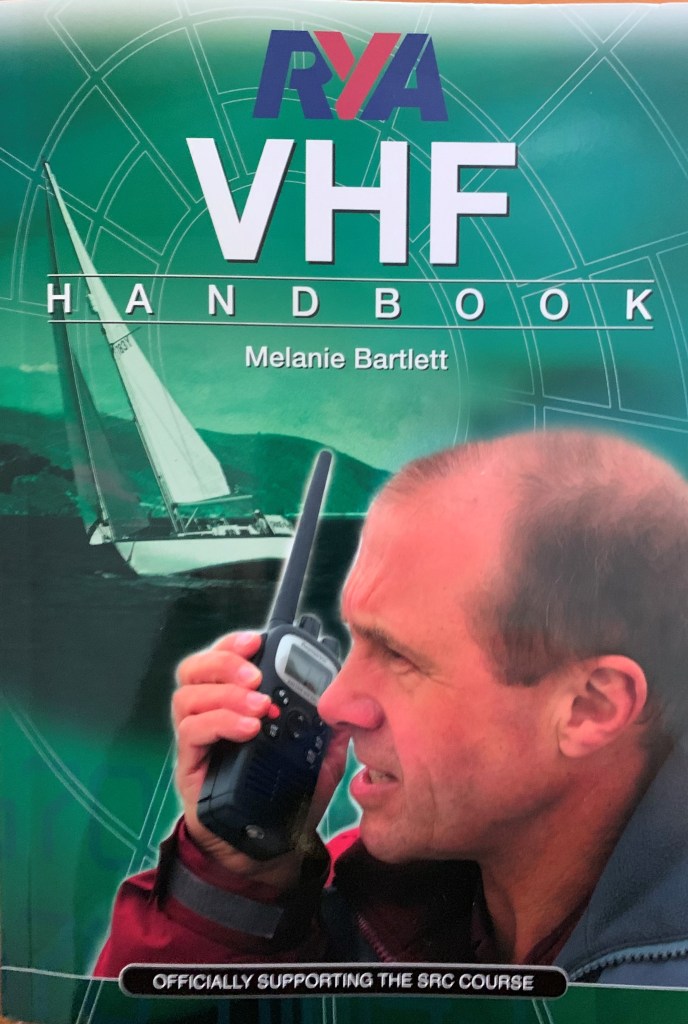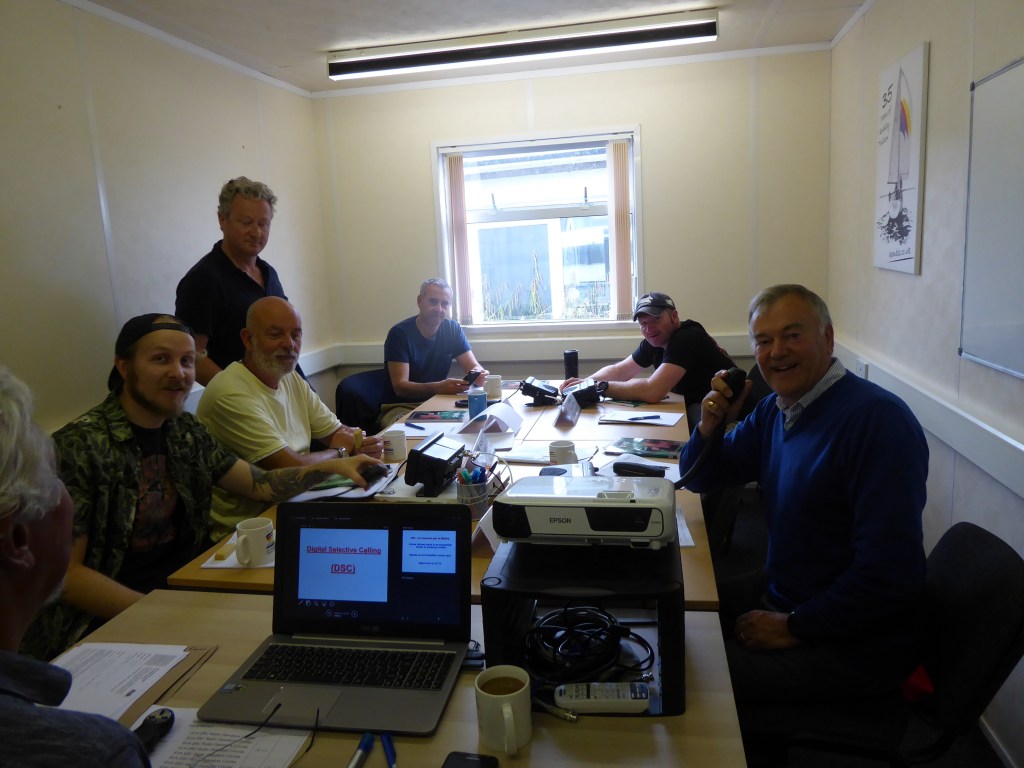I don’t think this is a form of communication used very often these days. Instead, to bring us into the modern world, John and I attended a VHF course on 20th July at Hamble School of Yachting. The School was bought by Clipper at the beginning of this year but courses are open to anyone. For me Hamble was a bit of a trip down memory lane as I used to have a boyfriend who was training to be a BA pilot down there. All gone now. The only place I recognised was The Bugle, a pub on the river.
The official title of the course is “RYA SRC Radio Operators Course and Exam”. The last word rather put me off, I’ve not done an exam since our wine making course, which wasn’t a life or death situation. The TLAs (Three Letter Acronyms) stand for Royal Yacht Association and Short Range Certificate. We received a very smart book so that we could learn about it before we attended the course. We were expected to read this and also make sure we knew the Phonetic Alphabet (A alpha, B bravo, C Charlie, D delta etc) and the distress calls Mayday and PanPan. These are both based on French “m’aidez” as in “help me” and “panne” meaning “breakdown”. Other French terms used are “Seelonce”, “Seelonce feenee” and “Prudonce” which I hope need no translation (say them aloud).

There were seven of us in a very narrow room with our tutor. There should have been eight but maybe that person was put off by the dreaded E word. I provided diversity in that everyone else (including the tutor Dave and our examiner James) were white and male. Other than John and I, all the others either already had their own boats or were thinking of getting one. There was an Italian who could not believe that in this country anyone can go out and buy a boat and set off with no qualifications. In Italy you and the boat need papers and you can expect to be asked to produce them. Over here, it’s only when chartering a boat that you’re likely to have to show you know what you’re doing (in theory if not in reality).

Having introduced ourselves and made sure we had coffee it was down to business. In front of each pair was a radio, but before we could play with that we had some serious learning to address. A lot of abbreviations such as GMDSS and many others that I won’t bore you with. (Global Marine Distress and Safety System, as you asked). We only learnt about VHF as that’s what’s used by small craft, and even then we only need to know about a dozen channels. For ease of remembering, instead of using the actual frequency such as 156.050 MHz, all relevant channels have a designation from 01 to 28 then 60 to 88. All new radios have DSC (digital selective calling) so that you can send with a single press of the button, which transmits on Channel 70. We learnt how to calculate how far a signal would reach: it depends on the height of your aerial above sea level, so the longer that is the better. Most boats will have the aerial at the top of their mast for this reason. There are different types of antenna but I’m not planning on taking you through too much technical stuff, if you want to know more it’s only a one-day course (with some reading beforehand).
Although we may think of using a radio to send out a distress message, most of the time we should be using it to communicate with other vessels or a marina when we want to stop for the night. There is an etiquette to all of this which we needed to know. Simple things like don’t chatter endlessly to your mates on another boat, don’t transmit music, no bad language, make sure the Skipper has approved the use of the radio etc. We were reminded that “broadcast” means that everyone in hearing distance will pick you up. You need to identify yourself every time you talk and say “over” when you want the other person to reply. “Out” means you’re signing off. “Over and out” means you watched too many TV programmes as this is a meaningless phrase and indicates that you don’t know what you’re doing. Channel 16 is the main one that is used to send out an initial signal: if you’re calling a specific boat then you’ll agree to use a different channel to leave 16 free as quickly as possible. Everyone will be listening on this for any distress calls.

There are two certificates that are important: the Radio Licence for the boat and the Authority to Operate which means you have learnt how to use the radio.
Now the exciting part, operating the radio. There are five types of DSC alert: distress (“grave or imminent danger to life or vessel”), urgency (we have a problem but it’s not life threatening), safety (more often used by the coastguard for e.g. a weather or navigational warning), routine (ship-to-ship) and group (usually temporary for a race or other event). We practiced them all. The first, distress, is what we know as Mayday and anyone in hearing range should respond, but wait for a short while to see if the coastguard pick it up, before speeding to the rescue of the distressed boat. If you want to help identify what problem you have, the radio has “designated” issues which are abandoning ship, piracy, man over board (MOB), fire, flooding, collision, grounding, listing, sinking and adrift. All sound pretty worrying.You make the distress call (Mayday and who you are, in brief) then the distress message. Each radio will have a laminated card or similar with the information you need to give, but just in case it’s not there we learnt the nonsense word MIPDANIO as shown in a picture above. SO: “Mayday”, Identification, Position of the vessel, type of Distress you’re in, “Assistance required immediately”, Number of people on board (so they can all be found), any other useful Information, “Over”.

If you’ve picked up a Mayday and no-one else has responded, you can send a Mayday Relay, as an urgency alert (it’s not you in immediate danger). This urgency is also used for PanPan where, for example, you may have steering problems or a medical issue that you don’t know how to treat.
John and I shared a radio and our “vessel” was named Old Gaffer. No comment. (Another was Hot Stuff, someone had fun choosing the names!). Every radio will have a call sign and a MMSI (Maritime Mobile Service Identity number, effectively your mobile number). We had to use these to call each other and either arrange a meeting and transmit a distress or urgency message, having decided what the issue was (someone overboard versus engine failure for example).

After lots of practice and lunch, we then had the exam in two parts. The first was a lot of questions where we had to score 16/25 to pass. In the past, I’ve galloped through these then gone back to see which I’d got wrong. Unfortunately I usually suffer doubts and alter them needlessly. This time I finished and handed my paper over to James so I couldn’t think any more about it. Then three of us went out of the room whilst the others sent messages on the radios. We could hear James asking questions such as “Would you really say that? How many times should you say Mayday? Which channel should you have used then?” All of which were a bit nerve-wracking, I think I’d rather have gone in the first group. After what seemed like hours the rest of us went in to do the live bit. It was good to have a practice so that in real life if faced with this we’d know what to do. I’d had to transmit a Mayday practice on our Scottish trip (see post 27) and now it all makes sense!
The good news: we all passed, you can invite me on your boat any time. I’m just waiting for my Authority to Operate in the post.
